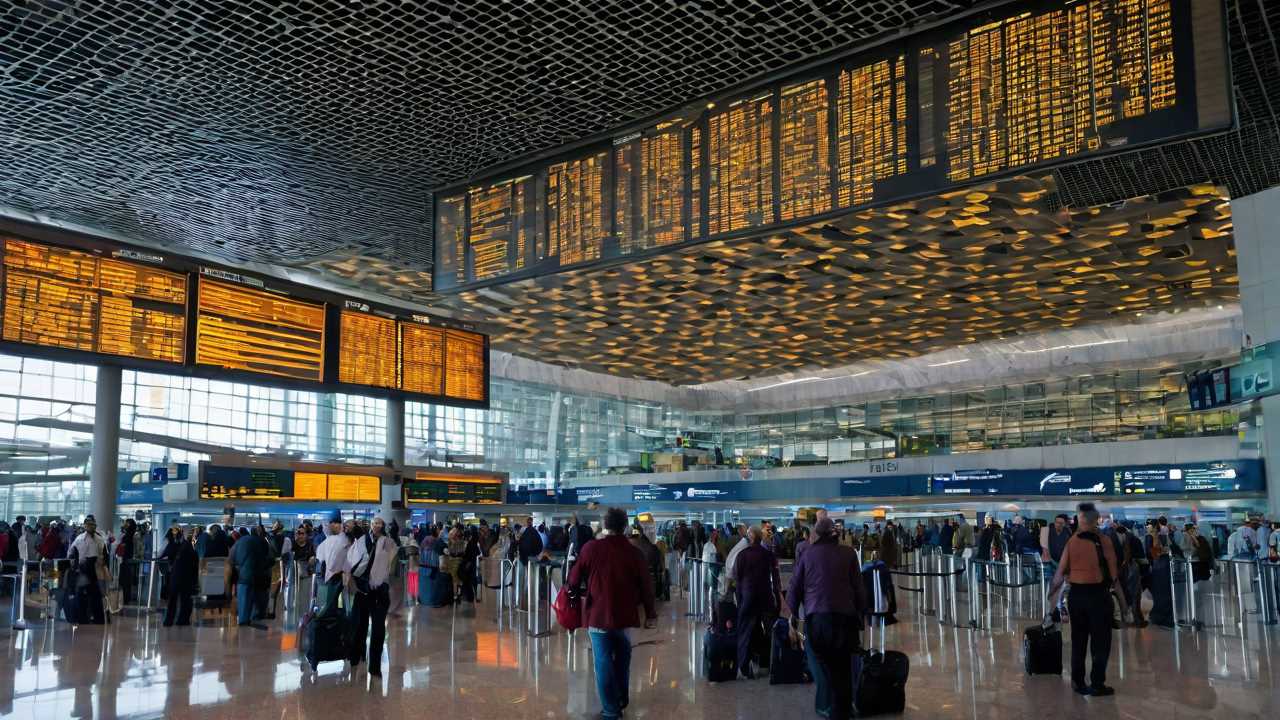
The recent cyber attack at Beirut International Airport has once again highlighted the vulnerability of critical infrastructure systems to malicious hackers. The breach of the Flight Information Display System (FIDS) and the subsequent disruption of the Baggage Handling System (BHS) have caused significant disruptions to both domestic and international air travel.
As the investigation into this attack unfolds, it becomes increasingly evident that airports and other key infrastructure facilities must prioritize robust cybersecurity measures to prevent future incidents.
In this article, we will look at details of the Beirut International Airport cyber attack, its implications for airport security, and the urgent need for enhanced cybersecurity measures to safeguard against such threats.
Key Takeaways
- Beirut International Airport experienced a cyber attack on its Flight Information Display System (FIDS) and Baggage Handling System (BHS).
- Hackers used the attack to display a message claiming that Hezbollah and Iran are taking the country to war and threatening to bomb the airport.
- The cyber attack disrupted airport operations and compromised the security and privacy of sensitive information.
- This incident highlights the ongoing threat of cyber attacks on critical infrastructure and the need for robust cybersecurity measures in the aviation industry.
Breach of Flight Information Display System

The recent breach of the Flight Information Display System (FIDS) at Beirut International Airport has raised concerns about the vulnerability of critical airport infrastructure to cyber attacks. Hackers successfully breached the FIDS, which is a crucial system for displaying flight information to passengers and airport staff. This breach not only disrupted the operations of the airport but also raised questions about the security of airport infrastructure worldwide.
The incident highlights the need for robust cybersecurity measures to protect critical systems in airports and other transportation hubs. As airports continue to rely on digital systems for efficient operations, it is imperative that cybersecurity becomes a top priority.
This breach serves as a reminder that cyber attacks are a real threat to the aviation industry and should be addressed with urgency and vigilance.
Disruption of Baggage Handling System

The cyber attack on Beirut International Airport also resulted in the disruption of the Baggage Handling System (BHS), further underscoring the critical impact of the breach on airport operations.
The BHS is a crucial component of airport infrastructure that ensures the efficient movement of luggage from check-in to the aircraft. With the system compromised, the airport faced significant challenges in managing passenger baggage, leading to delays and potential loss of luggage.
The disruption not only inconvenienced passengers but also posed security risks, as the compromised system could have been exploited to smuggle illegal items or compromise the integrity of the baggage screening process.
The incident highlights the vulnerability of critical airport systems to cyber attacks and the need for robust cybersecurity measures to safeguard airport operations and passenger safety.
Message Displayed by Hackers

Following the disruption of the Baggage Handling System at Beirut International Airport due to the cyber attack, the hackers left a chilling message displayed on screens throughout the airport. The message claimed that Hezbollah and Iran are taking the country to war and that arms smuggling will lead to the bombing of the airport.
This provocative message not only created panic and fear among travelers and airport staff but also highlighted the potential consequences of cyber attacks on critical infrastructure.
The brazen act of the hackers serves as a reminder of the growing threat landscape and the need for robust cybersecurity measures to safeguard airports and other vital facilities. It also underscores the importance of proactive measures, such as regular security assessments and employee training, to mitigate the risk of cyber attacks and ensure the safety and security of airports worldwide.
Impact on Domestic and International Air Travel

The cyber attack on Beirut International Airport has had significant repercussions on both domestic and international air travel. The breach of the Flight Information Display System (FIDS) and the disruption of the Baggage Handling System (BHS) have caused widespread chaos and inconvenience for passengers.
Domestic travelers have experienced delays and cancellations as the airport struggles to restore its systems and operations. International flights have also been affected, with some airlines rerouting or canceling flights altogether.
The cyber attack has not only impacted the immediate travel plans of passengers but has also raised concerns about the security and reliability of the airport’s infrastructure. As investigations continue and security measures are strengthened, it is crucial for airports worldwide to prioritize cybersecurity to ensure the safety and efficiency of air travel.
Key Role of Beirut International Airport

Beirut International Airport plays a pivotal role as a vital transportation hub for both domestic and international air travel. Located about 9 kilometers from the city center of Beirut, the airport serves as a gateway for travelers entering and leaving Lebanon. It facilitates the movement of passengers and cargo, connecting Lebanon to various destinations around the world.
Beirut International Airport is named after Rafic Hariri, a former Prime Minister of Lebanon, reflecting the significance of this infrastructure in the country. The recent cyber attack on the airport’s Flight Information Display System (FIDS) and Baggage Handling System (BHS) highlights the vulnerability of such critical infrastructure to malicious activities.
Protecting the airport’s operations and ensuring the security and safety of travelers are essential for the smooth functioning of the aviation industry and the economy as a whole.
Cybersecurity Vulnerabilities Exposed

Cybersecurity vulnerabilities have been exposed in thiscyber attack on Beirut International Airport. The breach of the Flight Information Display System (FIDS) and the disruption of the Baggage Handling System (BHS) highlight the weaknesses in the airport’s security infrastructure.
The hackers were able to display a message on screens at the airport, spreading false claims about Hezbollah and Iran’s involvement in inciting war and arms smuggling. This attack not only compromised the airport’s operations but also undermined the trust and confidence of passengers and stakeholders in the airport’s security measures.
It serves as a stark reminder of the constant threat posed by cybercriminals and the urgent need for robust cybersecurity measures to protect critical infrastructure like airports. Lessons must be learned from this incident to strengthen the airport’s defenses and prevent future cyber attacks.
Potential Threats to User Privacy and Security

In today’s digital landscape, users face an array of potential threats that can compromise their privacy and security. The recent cyber attack serves as a stark reminder of the vulnerabilities that exist in our interconnected world. Hackers were able to breach the Flight Information Display System (FIDS) and disrupt the Baggage Handling System (BHS), causing chaos and spreading their message of conflict and violence.
This incident highlights the potential for cyber attacks to not only disrupt critical infrastructure but also compromise sensitive information. It is crucial for users to remain vigilant and take proactive measures to protect their privacy and security. Regularly updating passwords, enabling two-factor authentication, and using reliable security tools can go a long way in mitigating these potential threats.
Prompt Response From Cisco

Cisco’s prompt response to the critical bug in its Unified Communications products demonstrates their commitment to addressing security vulnerabilities. The company has issued a warning about the bug, emphasizing the need for immediate patching to prevent potential exploitation.
Unified Communications products are widely used for communication and collaboration in organizations, making them a prime target for hackers. The bug, if left unaddressed, could lead to unauthorized access or compromise of sensitive information.
Frequently Asked Questions
How Did the Hackers Breach the Flight Information Display System (Fids) at Beirut International Airport?
The hackers breached the Flight Information Display System (FIDS) at Beirut International Airport, potentially compromising the integrity of flight information. The method used to breach the system has not been disclosed.
What Specific Disruptions Did the Cyberattack Cause to the Baggage Handling System (Bhs)?
The cyberattack on Beirut International Airport’s Baggage Handling System (BHS) caused significant disruptions. The hackers’ breach resulted in the system’s malfunction, leading to delays in baggage inspection and potentially compromising the airport’s security measures.
What Was the Exact Message Displayed by the Hackers on the Screens at the Airport?
The hackers displayed a message on the screens at Beirut International Airport, claiming that Hezbollah and Iran are taking the country to war, and that arms smuggling will lead to the bombing of the airport.
How Did the Cyberattack Impact Both Domestic and International Air Travel?
The cyberattack on Beirut International Airport disrupted both domestic and international air travel. The hackers breached the Flight Information Display System (FIDS) and the Baggage Handling System (BHS), causing significant disruptions and inconvenience for passengers and airlines.
What Is the Key Role of Beirut International Airport in the Region’s Air Travel Infrastructure?
Beirut International Airport plays a key role in the region’s air travel infrastructure, serving as a gateway for both domestic and international flights. Its strategic location and facilities support the movement of passengers and cargo, contributing to the region’s connectivity and economic growth.
Read Get Hitch for all your AI, VPN, tech and cyber security news and information








